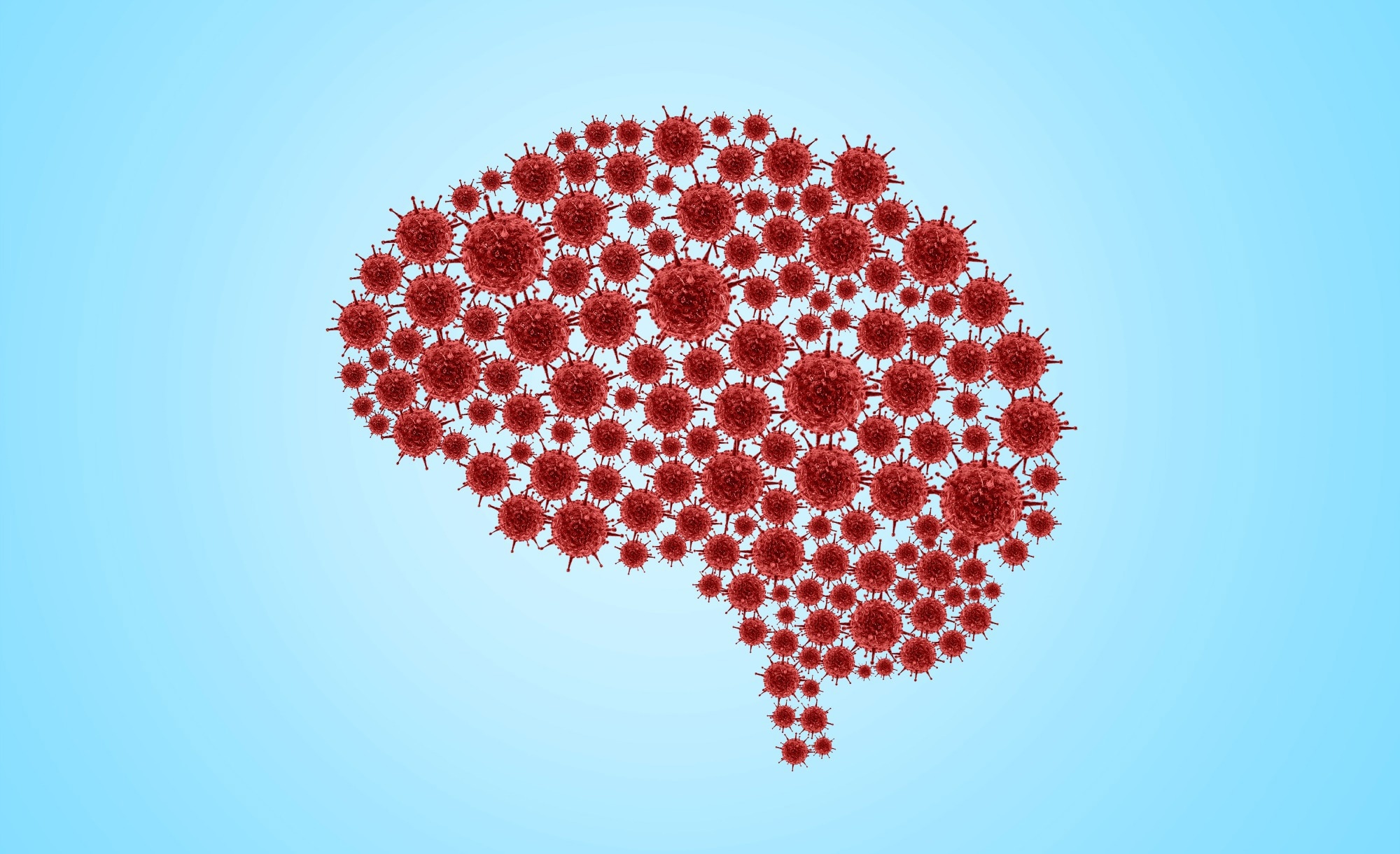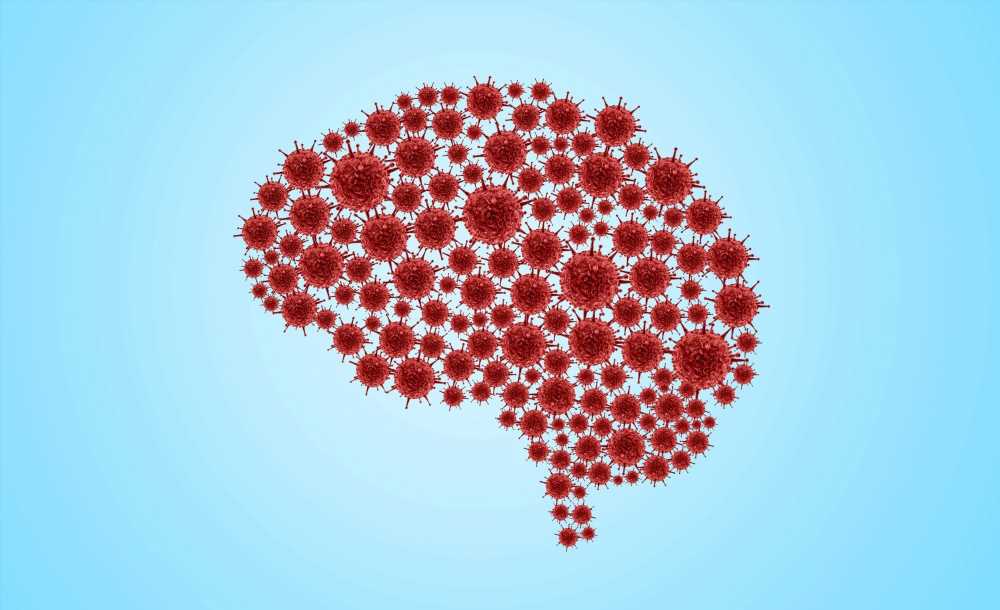In a recently published article in the journal Current Opinion in Neurobiology, scientists at Washington University School of Medicine, St. Louis have described how immunological alterations associated with severe acute respiratory syndrome coronavirus 2 (SARS-CoV-2) infection may impact brain activities and induce acute and post-acute neurological symptoms in coronavirus disease 2019 (COVID-19) patients.
 Neuroinflammation and COVID-19. Image Credit: DOERS / Shutterstock
Neuroinflammation and COVID-19. Image Credit: DOERS / Shutterstock
Peripheral immunity and brain
SARS-CoV-2, the causative pathogen of COVID-19, is known to affect the innate immune system, leading to abnormal activation of the interferon signaling pathways and induction of hyperinflammation. The state of hyperinflammation is characterized by excessive production of pro-inflammatory cytokines, which in turn can disrupt the function of the blood-brain barrier (BBB).
In severe COVID-19 patients, excessive levels of systemic cytokines can disrupt the BBB integrity and trigger the onset of neurological symptoms. Besides the BBB, systemic cytokines can directly affect neuronal activities and cause cognitive deficits in COVID-19 patients.
Evidence suggests that SARS-CoV-2 infection triggers cytokine release in the cerebrospinal fluid, which subsequently can impair normal brain activities. Cytokines can also directly target different neural cells to alter brain activities. By targeting neural stem cells, cytokines can reduce neurogenesis and cause learning and memory deficits. Similarly, cytokines can target neurons and astrocytes to trigger glutamate excitotoxicity.
Although pro-inflammatory monocytes are required for viral clearance during COVID-19, their long-term presence can promote immunopathology, leading to the development of long-COVID symptoms. In addition, these monocytes infiltrate the brain through the BBB, leading to the induction of neuroinflammation. Similarly, infiltration of virus-infected monocytes can lead to the release of viral RNA in the brain and subsequent induction of neuropathologies.
Regarding adaptive immune cells, studies have shown that increased blood and lung levels of cytotoxic T cells can induce the development of specific long-COVID symptoms, including gastrointestinal and respiratory symptoms. Some post-mortem studies have shown a mild-to-moderate induction in the levels of cytotoxic, CD8+, and CD4+ T cells in the brain of COVID-19 patients.
Blood-brain barrier
It is well-established that neurological symptoms in COVID-19 are associated with cerebral vascular dysfunction. The most common features are brain hemorrhage and ischemia. In addition, abnormal cerebral blood flow and frontoparietal hypometabolism have been observed in COVID-19 patients. All these changes are suggestive of disrupted BBB. Studies conducted on COVID-19 animal models have indicated that SARS-CoV-2 infection increases BBB permeability.
The analysis of brain endothelial cells has highlighted the presence of SARS-CoV-2 infection. However, it is uncertain whether the virus directly targets BBB endothelial cells or it enters the brain by disrupting the BBB. In this context, studies have shown that SARS-CoV-2-mediated infection of endothelial cells is a rare event and that the infection is only possible if there is overexpression of angiotensin-converting enzyme 2 (ACE2).
Although SARS-CoV-2-mediated infection of BBB endothelium is a rare event, there is evidence indicating that the spike protein of SARS-CoV-2 can cross the BBB in an ACE2-dependent manner. In addition, SARS-CoV-2-mediated induction in the expression of adhesion molecules, as well as antiviral and antigen-presenting genes, has been observed in the brain blood vessels. These observations indicate alterations in the BBB endothelium in COVID-19.
Post-mortem analysis of COVID-19 brain tissue has shown the increased formation of string vessels (collapsed vessels incapable of blood flow) and vascular endothelial cell death. Specific viral proteins, including the main protease and spike protein, have been identified as potent inducers of string vessel formation.
Brain resident immunity and COVID-19
Microglia are resident myeloid cells in the brain that are crucial for inducing immune responses to brain injury or infection.
Post-mortem analysis of COVID-19 brain tissue has identified activated microglia in the brain parenchyma. Moreover, it has been observed that SARS-CoV-2 infection alters the expression of certain genes related to innate immune signaling and cell stress pathways.
SARS-CoV-2 spike protein that enters the brain through disrupted BBB is recognized by the microglia, leading to activation of the brain's innate immune system and sustained induction of inflammatory response.
Sustained activation of microglia can lead to pathological changes in the brain. It has been observed that microglia derived from COVID-19 patients and neurodegenerative disease patients share similar transcriptomic profiles. The spike protein-induced activation of microglia in the rat brain has been found to associate with sickness behavior, anxiety, and cognitive deficit.
Overall, these observations indicate that microglia may play a role in inducing long-term neurological symptoms in COVID-19 patients.
Besides microglia activation, increased levels of neurodegeneration and glial activation markers have been observed in the blood samples of COVID-19 patients. Moreover, reduced synaptic activity in the excitatory neuron increased nerve cell death, and reduced neurogenesis has been observed following SARS-CoV-2 infection.
Overall, these findings suggest that SARS-CoV-2-induced alteration in neuronal functions may be associated with COVID-19-related brain pathologies.
- Abigail Vanderheiden, Robyn S. Klein. 2022. Neuroinflammation and COVID-19. Current Opinion in Neurobiology. https://www.sciencedirect.com/science/article/pii/S0959438822001027
Posted in: Medical Science News | Medical Research News | Medical Condition News | Disease/Infection News
Tags: ACE2, Angiotensin, Angiotensin-Converting Enzyme 2, Antigen, Anxiety, Blood, Blood Vessels, Brain, Brain Hemorrhage, CD4, Cell, Cell Death, Coronavirus, Coronavirus Disease COVID-19, covid-19, Cytokine, Cytokines, Endothelial cell, Enzyme, Genes, Immune Response, Immune System, immunity, Interferon, Medicine, Microglia, Nerve, Neural Stem Cells, Neurodegeneration, Neurodegenerative Disease, Neurogenesis, Neuron, Neurons, Pathogen, Protein, Respiratory, RNA, SARS, SARS-CoV-2, Severe Acute Respiratory, Severe Acute Respiratory Syndrome, Spike Protein, Stem Cells, Stress, Syndrome, Vascular, Virus

Written by
Dr. Sanchari Sinha Dutta
Dr. Sanchari Sinha Dutta is a science communicator who believes in spreading the power of science in every corner of the world. She has a Bachelor of Science (B.Sc.) degree and a Master's of Science (M.Sc.) in biology and human physiology. Following her Master's degree, Sanchari went on to study a Ph.D. in human physiology. She has authored more than 10 original research articles, all of which have been published in world renowned international journals.
Source: Read Full Article
